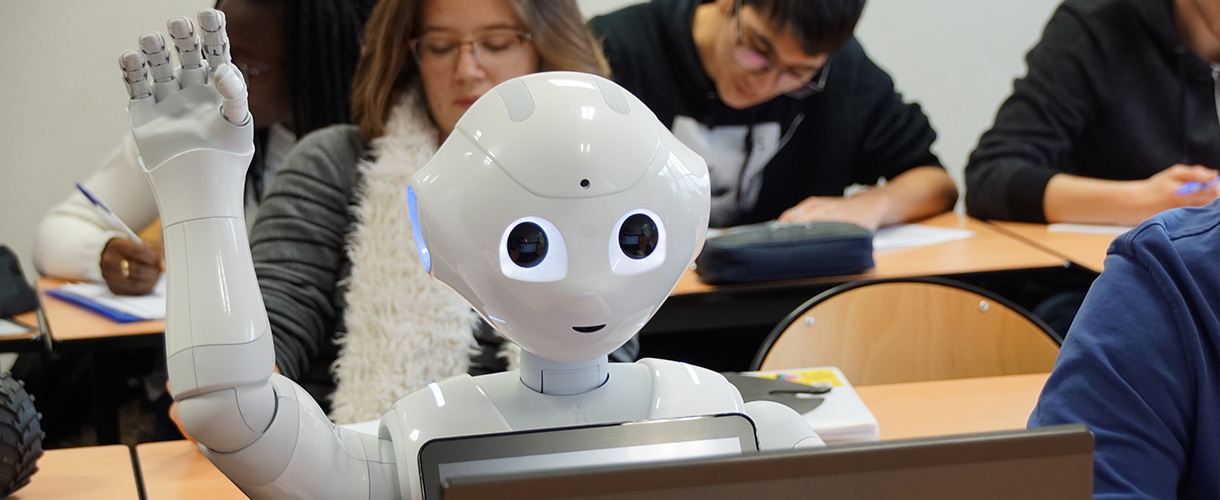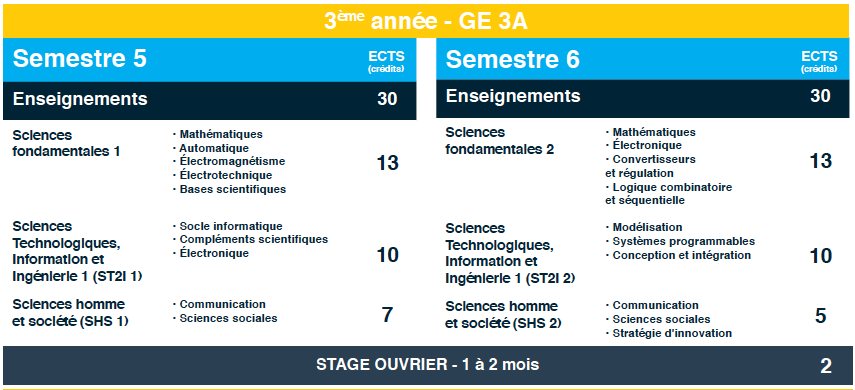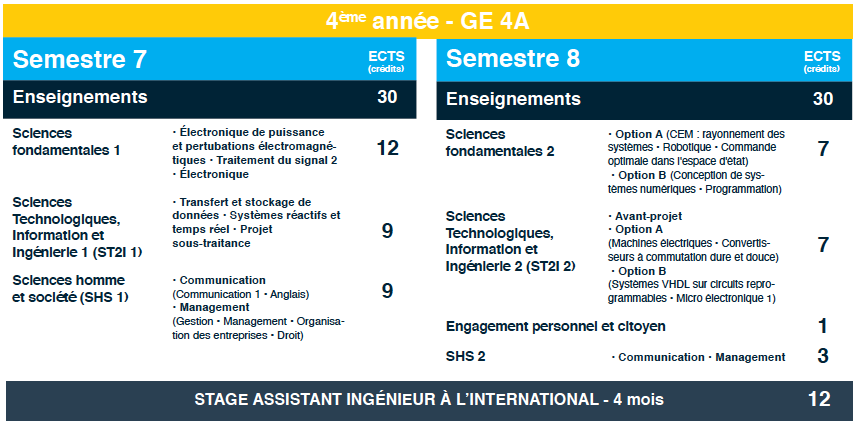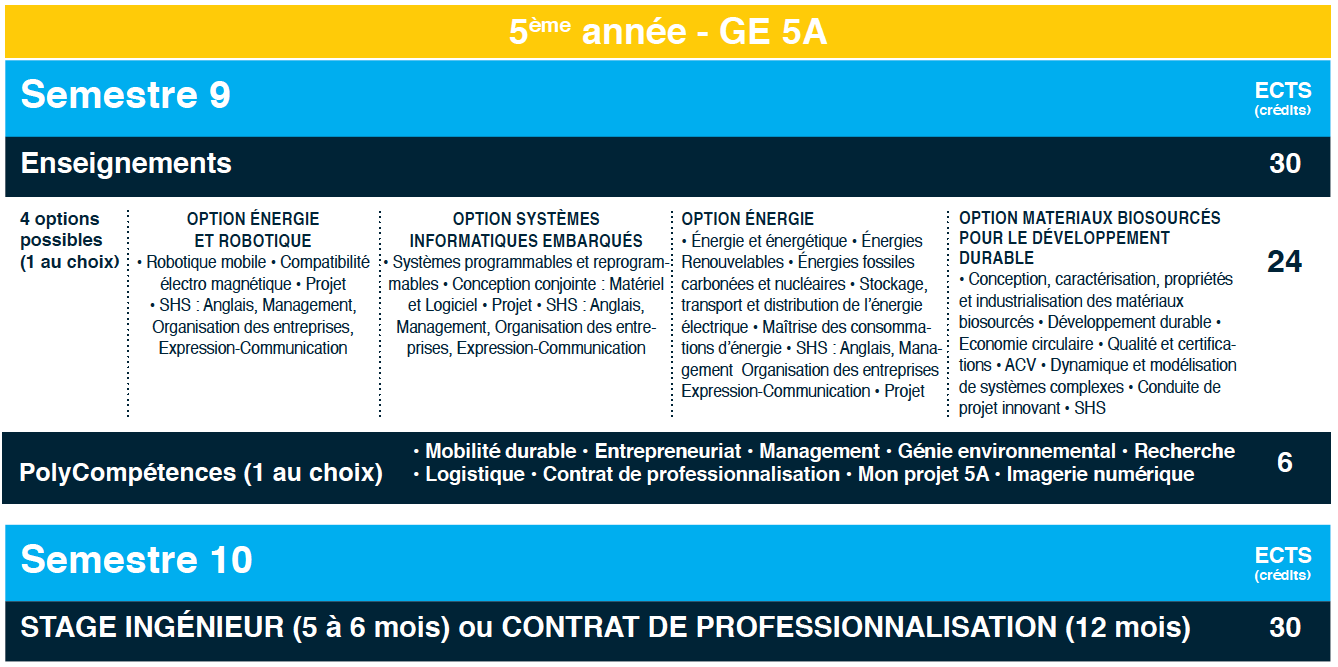Systèmes Embarqués, Énergie Électrique et Robotique
Accéder aux sections de la fiche
Call to actions
Details
Introduction

The Electrical Engineering department trains engineers capable of managing projects by specifying, designing, and developing complex electronic systems. The skills taught are aligned with the needs of companies in the sector.
Electrical Engineering graduates are actively involved in addressing major societal challenges such as future mobility and renewable energy.
Engineering students learn to:
-
Work effectively in teams
-
Operate in high-tech fields such as electrical energy conversion, renewable energy, robotics, and embedded computing systems
-
Understand and solve complex problems
-
Successfully carry out practical and applied projects
Person in charge of the academic program
Tél : +33473405280
Email : christophe.pasquier@uca.fr
Partnership
In agreement with

Admission
-
Prerequisites training
The Electrical Engineering program recruits students for the engineering cycle from:
-
Preparatory classes (CPGE): MP, MPI, PC, PSI, PT, ATS, TSI
-
Students from the Polytech PeiP preparatory cycle
-
University students (L2, L3)
-
Students from BUT programs with a profile suited to the training
-
Other applicants with a 2- or 3-year degree whose background aligns with the program requirements
-
-
Conditions of applications
Program
Les informations ci-dessous sont données à titre indicatif et peuvent faire l'objet de mises à jour.


Content of the academic programm
Structure of the Electrical Engineering Program
The Electrical Engineering program is spread over three years:
-
First year: Core fundamentals in electrical and electronic engineering, along with a Common Core shared across all Polytech specialties.
-
Second year: Reinforcement of specialized engineering skills and business sciences.
-
Third year: Advanced specialization based on selected tracks, exposure to the job market, and opportunities to explore various industrial or research topics (including the possibility of pursuing a double degree with various Master’s programs at Université Clermont Auvergne or a Master of Science abroad).
During the final year, students choose from two specializations within the department and two cross-disciplinary options open to all Polytech departments:
Specializations within the Electrical Engineering Department
Energy Conversion and Robotics
Graduates are trained to manage interdisciplinary projects that combine electrical energy conversion and robotic system control. The curriculum addresses the use of electrical energy, motor control, robot motion management, and EMC (Electromagnetic Compatibility) considerations between systems and their environment.
Embedded Computing Systems
Engineers are prepared to design, develop, operate, and maintain digital systems involving both hardware and software. This specialization focuses on the design, implementation, and verification of embedded systems.
Cross-Departmental Options
"Energy" Track
Training focused on maintenance, management, and optimization of energy systems, including the integration of renewable energy into the energy mix.
"Bio-based Materials for Sustainable Development" Track
Project-based learning in pairs, focused on bio-based materials. Topics include circular economy, sustainable development, and applications in sectors such as urban planning, construction and public works, biotech and biomedical, packaging and plastics, and materials for mobility.
Double Degree Opportunities
The department offers students the opportunity to pursue a double degree. [Learn more]
Project-Based Learning
The program combines:
-
30% Lectures
-
33% Tutorials
-
22% Lab work
-
15% Project work
Projects play a major role in the curriculum. The first project takes place at the end of the first year, allowing students to apply their learning from the first two semesters through a hands-on project.
In later years, students work in pairs on projects proposed by industrial partners, either related or unrelated to electrical engineering. Each student commits 200 hours, gaining experience in technical implementation, project methodology, and project management. Students are supported by faculty and industry mentors, and they experience real-world practices such as subcontracting. [Learn more about the projects]
Professional Training Contract (Contrat de professionnalisation)
Final-year students can pursue a professional training contract.
They change status from student to employee of the host company. The contract lasts 12 months.
A Win-Win Approach
For students:
The aim is to gain professional experience while completing the engineering degree. Compensation is based on a percentage of the minimum wage (SMIC), depending on age and education level. For exact figures, refer to the [Ministry’s official site].
For companies:
They gain access to a quickly operational engineer trained to their methods. The contract may entitle them to social security contribution exemptions, under certain conditions.
Eligibility
-
Polytech Clermont students in initial training, aged 16 to 25, admitted to the final engineering year
-
All employers subject to funding continuing professional training, except the State, local authorities, and their administrative public institutions
Students with disabilities are supported throughout the process. [See support programs HERE]
Evaluation Methods
This pathway includes:
-
2 intermediate oral evaluations
-
1 final report
-
1 final defense
These are in addition to ongoing assessments conducted by instructors.
Note: Partial validation of skill blocks is not possible.
Funding
The company covers all training costs, including tuition and registration fees at Polytech Clermont. Part or all of these costs may be covered by the company’s Skills Operator (OPCO).
-
- AN 1
-
Semestre 5
-
-
-
Mathématiques
-
Statistiques et probabilités
-
-
Automatique
-
Electromagnétisme
-
Electrotechnique
-
-
-
-
Electronique
-
Traitement du signal
-
Mécanique
-
Biologie
-
Matière matériaux
-
Energétique
-
Initiation dessin technique
-
Autour du web
-
Maths 1 GC/GE/GP/Archi
-
Maths 2 GC/GE/Archi
-
Maths GB
-
Méthodes statistiques
-
-
Socle informatique
-
Eléctronique 1
-
-
-
-
Droit
-
Economie
-
-
-
E2C1
-
Anglais 1
-
-
-
-
Mathématiques 2
-
Eléctronique 2
-
Logique comb et seq
-
Convertisseurs régul
-
-
-
-
Analyse numérique
-
Bases de données
-
-
Sys programmables
-
Conception et intégration
-
-
-
-
E2C 2
-
-
Anglais unique
-
-
Anglais LV1
-
-
Allemand
-
Espagnol
-
Autre langue vivante
-
Français renforcé
-
-
-
-
-
-
Ouverture - projet
-
Ouverture - Respo asso
-
Ouverture - SHBN
-
-
Stratégie d'innovation
-
-
UE7 STAGE
2 crédits
-
- Elément année GE4A
-
Semestre 7
-
-
EP et CEM
-
Eléctronique
-
Traitement du signal 2
-
-
-
-
TSD GE
-
TSD mutualiséTSD Mutualisé avec MASTER EUPI
-
-
Sys reac & tps réel
-
Projet sous traitance
-
-
-
-
Expression com. S7
-
Anglais choix unique
-
-
-
Gestion
-
Psychosociologie
-
Droit
-
-
-
-
-
CEM rayonnements sys
-
CDE optimale espace etat
-
Robotique
-
-
-
Concept sys num
-
Programmation
-
-
-
-
-
Machines éléctriques
-
Conv a commu dure & douce
-
Projet: Avant projet
-
-
-
Synt VHD / Cir repro
-
Micro electronique 1
-
Projet: Avant projet
-
-
-
-
Communication 2
-
-
Anglais choix unique
-
-
Anglais LV1
-
-
Allemand
-
Espagnol
-
Autre langue LV2
-
-
-
-
-
UE7
12 crédits
-
UE8
1 crédits
-
- Elément année GE5A
-
Semestre 9
-
-
Polytech'Entrepreneuriat
-
Polytech'Gestion Environ.
-
Polytech'Management
-
Polytech'Recherche
-
Polytech'Ressources Humaines
-
Polytech'Ind cosmétiques
-
Polytech'Mon projet 5A
-
Polytech'Imagerie num
-
Polytech'Archistructure
-
Polytech'Urbanisme
-
Polytech'Logistique
-
Polytech'Contrat Pro
-
Polytech'Mobilité Durable
-
-
-
-
-
CEM GE
-
CEM MA
-
-
Elec puiss & électrotech
-
Robotique mobile
-
Projet
-
-
-
-
Systèmes programmables GE
-
Systèmes programmables Mutualisé avec MASTER EUPI
-
-
-
CONCEPTION CONJOINTE GE
-
CONCEPTION CONJOINTE MA
-
-
Projet
-
-
-
Energie et énergétique
-
Energies renouvelables
-
NRJ fos. carbon. et nuc.
-
Stock. tr. & distr. el.
-
Maitrise des conso. NRJ
-
-
-
Module 1: Les matériaux biosourcés pour le développement dur
-
Module 2: Propriétés et caractérisation des matériaux biosou
-
Module 3: Industrialisation des matériaux biosourcés
-
Module 4: Réglementation, qualité, certification
-
Module 5: Développement durable et économique circulaire
-
-
-
-
EXPRESSION COMMUNICATION
-
ANGLAIS
-
PROJET
-
PSYCHOSOCIOLOGIE
-
-
-
BILAN MI-PARCOURS
-
BILAN FINAL
-
-
-
Matière stageMatière stage
-
-
What's next ?
Job opening
Business sector or job
- Embedded Computing Systems: professional and consumer electronic systems, defense industry, mobility
- Power Electronics and Electrical Engineering: automotive, aerospace, and railway industries
- Energy Production, Conversion, and Distribution
- Industrial and Mobile Robotics
- Automation
Professional integration
Top 5 Job Roles:
-
Research and Development Engineer
-
Design Engineer
-
Production Engineer
-
Information Systems Engineer
-
Sales Engineer
-
-
-
- Réussite, orientation et insertion
- Engagement étudiant
- Innovation pédagogique
